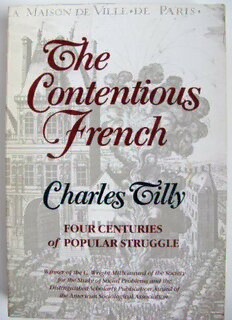
The Contentious French PDF
Preview The Contentious French
The Contentious French The Contentious French CHARLES TILLY The Belknap Press of Harvard University Press Cambridge, Massachusetts London, England Copyright © 1986 by the President and Fellows of Harvard College All rights reserved Printed in the United States of America 10 9 8 7 6 5 4 32 Library of Congress Cataloging-in-Publkation Data Tilly, Charles. The contentious French. Bibliography: p. Includes index. I. France—Politics and government—1589-1789. 2. France—Politics and government—1789—1900. 3. France—Politics and government—20th century. 4. Demonstrations—France—History. I. Title. DC55.T55 1986 944 85-9137 ISBN 0-674-16695-7 (alk. paper) (cloth) ISBN 0-674-16696-5 (paper) To Franc and Peg Smith, who helped me start Preface HEN DID MY WORK on this book begin? Depending on the defi- nition of "begin," it could be any time from my first exposure to French history in graduate school over thirty years ago to the wet, wet win- ter of 1974-75, when I first found myself laboring in the archives with this specific book in mind. In any case, it is easy to say when and how my research ended. I re- turned to the Archives Nationales in January 1984 to read material in the boxes concerning strikes, meetings, and demonstrations of the Popular Front. These crucial boxes had been "out for microfilming" the previous June. Appropriately, a strike of the magasiniers at the archives cut short my effort. No more documents for that trip! No way to know now whether in those last three boxes lurks the one document that sets everything straight, or refutes some major argument of the book. That uncertainty adds exactly the tension that ought to accompany an inquiry like this one; it can never really end. Through those many years, a host of people have helped me find the necessary material, organize the evidence, and put this book together. Ju- dith William-Powlett started the long file of helpers in Princeton during 1962-63. The following year, Lutz Berkner, James Doty, Lynn Lees, Ted Margadant, Andrejs Plakans, James Rule, Edward Shorter, Gerald Soliday, Cyrus Stewart, and I labored together in the library above Sage's grocery store in Cambridge. (David Landes sent most of that first group of collabo- rators my way; I have always been thankful to him for that favor.) Since then, at least a few people have always been involved in collecting, organiz- Preface Vlll ing, or analyzing the evidence. There is no way to single out a few of those dozens of collaborators without being unfair to the rest. Thanks to them all. I do, however, want to pay tribute to an institution. The University of Michigan's Center for Research on Social Organization, in the shabby- genteel Perry School building, housed my research projects for fifteen years. My colleagues, collaborators, and friends at CRSO pitched in to create a marvelous setting for research, discussion, and learning. In recent years, Mayer Zald, in his double role as center member and chair of Michigan's sociology department, has given CRSO indispensable aid. Within the cen- ter, Sheila Wilder dealt with its daily problems graciously; she also helped me repeatedly in the production of this book. Dozens of other staff mem- bers, faculty, and graduate students poured their efforts into seminars, fund- raising efforts, volleyball, midnight discussions, and research. Let me express my affection and gratitude to the people of CRSO. For criticism of various sections of this book, I am grateful to Ron Aminzade, Rod Aya, William Beik, David Bien, Julian Dent, Lynn Eden, Steve Fraser, Sharon Kettering, Michael Kimmel, M. J. Maynes, Leslie Moch, Robert Schneider, and Eugen Weber. (None of these critics has seen anything approaching the whole text; none of them therefore bears any re- sponsibility for its blunders.) Franc Smith set aside his own writing—and an urgent stack of student papers—to give me a splendid writer's reaction to the book. Aida Donald provided superb editorial guidance. Ann Hawthorne deftly combed the errors from my text. Tessie Liu, John Merriman, and Louise Tilly lent me valuable notes on their work in the archives of Maine- et-Loire, the army, and the Nord respectively. For financial support, I am happy to thank the John Simon Guggenheim Foundation; the National Sci- ence Foundation; the German Marshall Fund of the United States; the De- partment of History, University of Michigan; and the Horace Rackham School of Graduate Studies, University of Michigan. A very preliminary version of Chapters ι and 2 appeared as "Getting It Together in Burgundy," Theory and Society 4 (1977), 479-504. Some mate- rial from Chapter 5 appeared in "Routine Conflicts and Peasant Rebellions in Seventeenth-Century France," in Robert Weiler and Scott Guggenheim, eds., Power and Protest in the Countryside (Durham, N.C.: Duke University Press, 1982). In Chapter 12 I have adapted some passages from material in my "Violenza e azione colletiva in Europa. Riflessioni storico-comparate," in Donatella della Porta and Gianfranco Pasquino, eds., Terrorismo e violenza politica. Tre casi a confronto: Stati Uniti, Germania e Giappone (Bologna: II Mulino, 1983), and "Speaking Your Mind without Elections, Surveys, or IX Preface Social Movements," Public Opinion Quarterly 47 (1983), 461-478. All trans- lations of French sources are my own unless otherwise indicated. Louise Tilly was too busy with her own work to give this opus much direct attention. She and I know, however, how much it owes to her toler- ance, cooperation, and moral support. For that, and for much more, I am grateful to her.
